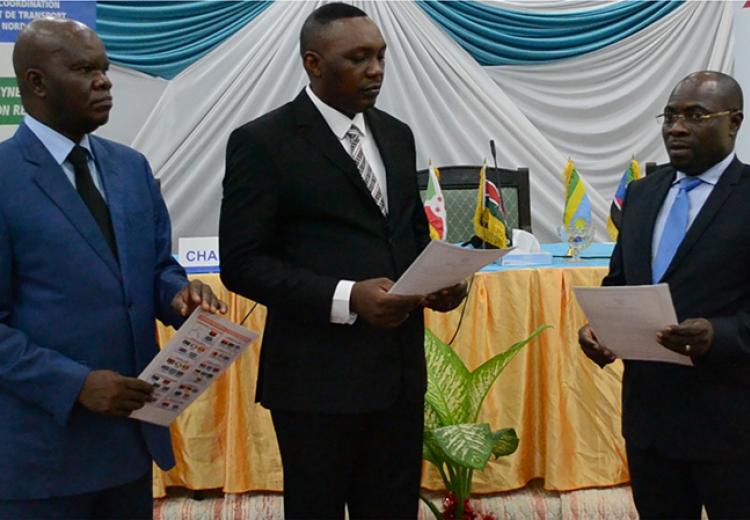Democratic Republic of Congo (DRC) officially submits ratification instruments of the Northern Corridor Agreement
On behalf of the Government of the Democratic Republic of Congo (DRC), JUSTIN KAMWANYA KALEMUNA LEM’S, Chairman of the Northern Corridor Transit and Transport Coordination Authority (NCTTCA) Executive Committee and CEPCOR Coordinator, officially submitted the ratification instruments of the Northern Corridor Agreement to the Executive Secretary of NCTTCA, Depositary of the Treaty, as provided for in the Agreement.
The ceremony was held on the sidelines of the NCTTCA Council of Ministers meeting held on 23 June 2016 in Mombasa, Kenya.
The Government of the Democratic Republic of Congo has ratified the Northern Corridor Transit and Transport Agreement since October 2015.
The Northern Corridor Transit and Transport Agreement (NCTTA) is a multilateral treaty to facilitate transit cargo between the Port of Mombasa and the hinterland of Member States namely Burundi, Democratic Republic of Congo, Kenya, Rwanda, South Sudan and Uganda. The first agreement was signed in 1985 and ratified in 1986.
The Northern Corridor Transit and Transport Agreement was revised and signed in Nairobi in 2007, and all Member States has now ratified it.
The NCTTA provides a mechanism for facilitating transit trade to the landlocked countries through the Port of Mombasa.
Prior to the treaty, transit trade operated on the basis of bilateral agreements, which did not offer a coherent framework for standardized services and transit trade procedures across the different Member State territories.
The Northern Corridor Transit and Transport Agreement comprises eleven (11) Protocols.
Protocol 1: Maritime Port Facilities
This protocol which is based on the rule of equal treatment governs the use by the contracting parties, of maritime port facilities of the Republic of Kenya, for the purpose of moving transit goods through those areas under the jurisdiction of the Kenya Ports Authority, or of any other port operator legally operating in Mombasa.
Protocol 2: Routes and Facilities
In this protocol, the Contracting Parties agree to designate on their territories the routes for use by the other Contracting Parties for their traffic in transit and inter-state trade, to make available facilities for use in connection with such traffic, and maintenance of the routes.
Protocol 3: Custom Control and Operations
This protocol provides for harmonization and simplification of customs controls and processes for clearance and handling of inter-state and internationally traded goods.
Protocol 4: Documentation and Procedures
This Protocol contains provisions related to international documents and standards relevant to transit trade and interstate transport within the Northern Corridor Member States. It also lays down provisions for the procedures to be used on the basis of other Protocols of the Agreement.
Protocol 5: Transport of Goods by Rail
In relation to this Protocol, the Contracting Parties agree on the modalities related to the transportation of goods in transit and in inter-state trade by rail.
Protocol 6: Transport of Goods by Road
This Protocol provides for transportation of goods in transit by road, including policy, regulations, and other road infrastructure standards.
Protocol 7: Inland Waterways Transport of Goods
In this Protocol are provisions related to development and harmonization of policies on transportation of goods by inland waterways, navigable waters, inland ports and navigation dues.
Protocol 8: Transport by Pipeline
The provisions of this Protocol relate to the transportation of petroleum products through the pipeline, delivery and redelivery points, petroleum product transport facilities including the extensions of pipeline to other regional members.
Protocol 9: Multimodal Transport of Goods
The provisions of this Protocol relate to application of the conditions of any international multimodal transport contract concluded in a country other than one of the Contracting Parties. It provides for claims, joint surveys, arbitration mechanisms and compensation for losses and damages of goods.
Protocol 10: Handling of Dangerous Goods
This Protocol covers the handling and transport within the territories of the Contracting Parties whether in the course of transit or in the course on inter-state trade of such materials, substances and articles which, in accordance with accepted international recommendations, are classified as dangerous goods.
Protocol 11: Measures of Facilitation for Transit Agencies, Traders and Employees
This Protocol contains provisions for the granting of facilities and making of arrangements in order to facilitate orderly management and conduct of inter-state traffic and traffic in transit, and for the smooth and speedy movement of such traffic on the respective territories of the Contracting Parties.

